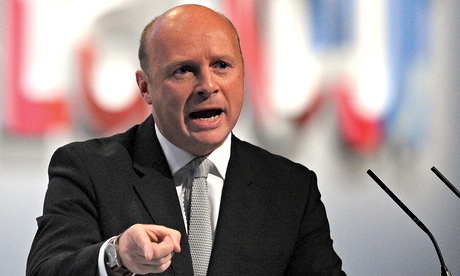
Liam Byrne, shadow universities minister, has today outlined some options for reform of UK higher education. In the pamphlet, entitled Robbins Rebooted a reference to the Robbins report on university expansion in 1963, Byrne calls for drastic changes to be made to the sector.
He says we either watch the university system slowly go bust and lose its place as a global science leader, or choose a different path. “Unless we get smarter as a country, we will get poorer,” he adds. “But with big reform of our university system, not big spending, we can build a richer, fairer country.”
We speak to Byrne about Labour’s plans for higher education ahead of the next general election and quiz him on some of his policy proposals.
What is your long-term policy for tuition fees?
“We will set that out closer to the election. Our direction of travel is putting fees down to £6,000, not putting them up, but we’ve still got to set that out. University finance is obviously a critical question, but there are some much bigger questions about the kind of university system that 21st century Britain needs if it is to thrive in the world that’s coming.
“The core argument in today’s pamphlet is, strategically, if we want to escape this cost of living trap that we are in, we are going to have to build a bigger university system that is more open and better connected with industry, because that is the only way we can build a bigger knowledge economy. Today universities are not ivory towers, they are power stations of the knowledge economy, they are critical to creating a richer country, but also a fairer country where more people have got the chance to get hold of a degree which is still the key to unlocking middle-class life.”
You suggest introducing technical degrees to give more options to young people. Could you see industry partners funding these courses?
“We’ve been really staggered by what students and sixth formers all over Britain have told us. They have basically told us that they are incredibly frustrated with the lack of choice of how you get a degree. Young people in Britain want to be able to join an employer and do their degree while they are studying so that they get a degree without incurring thousands of pounds worth of debt as a result. So we think that bringing universities and employers together with the government could allow us to revolutionise the number of earn while you learn degree places.
“The model is already working at Warwick and Jaguar Land Rover; Sheffield University and Rolls-Royce – it’s so popular that it is now harder to get into these places than it is to get into Oxford University. We think that this is the kind of system that should be expanded, where your degree place is basically cofinanced by the government and an employer, so the individual is able to emerge debt free.”
Won’t these technical universities just be like polytechnics?
“Technical universities are not like polytechnics because that was a binary system where you had traditional universities and polytechnics. We are saying we don’t want a binary system, but a unified system, and so the idea of a technical university is a partnership between a world-class science and engineering research department and industry and potentially big further education colleges. It then becomes possible for the first time to begin your degree at your local college and then finish it at a university.
“I can see a lot of universities getting on board. What people in local government have said to us is that they would like the new technical universities to be the heart of university enterprise zones that connect regional economies and universities in a new kind of alliance that fuels science based growth.”
The Russell Group has criticised your suggestion for a postgraduate loan saying that it may not meet the needs of every student and may cut off funding opportunities already available. What would you say in response?
“We have said that a view of postgraduate finance has got to be in the inbox for a new minister in 2015. I am really uncomfortable that many students today have access to postgraduate study cut off because of an arbitrary decision by a random bank manager. When we have gone round the country talking to Labour students they have ranked it as one of their top issues for sorting in the next parliament. We have got to look at it, because right now many brilliant young people want to pursue postgraduate study, employers tell them they need a masters, and they are not able to get that kind of opportunity because of a lack of assistance.
“Today’s system is not good enough and we have got to look at a better answer in the year’s to come. We are studying options that have been developed by the IPPR – but that’s the stage we are at.”
Do you agree with the plan to remove the cap on student numbers?
“What Ed Miliband said this summer is that we think the right priority for growth are these technical degrees that allow you to earn while you learn. We think there should be a bigger university system, the question is how do you grow the system? What the government is saying is let’s continue this dog-eat-dog university competition with massive subsidies to private providers – around a billion pounds of loan support is now going to students at private providers, with zero control on profits. That doesn’t sound like it’s going to create a system we need.”
Which policy, either proposed or introduced, by David Willetts do you most agree with and disagree with?
Agree: “Willetts did actually sustain a lot of policy that we developed in 2010 but never had the chance to implement – catapults, which bring universities and business together, are a really good example.”
Disagree: “Obviously tripling tuition fees in the way that the government did was obviously a mistake – it takes some doing to triple tuition fees and build a system that is almost as expensive as the last one, but somehow this government has pulled it off.”
Which higher education policies are you closer to – Tories or Lib Dems?
“The problem with the Lib Dems is that after their promises in the last election it is very hard to believe a word they say. And the Conservatives, I’m afraid, have not set out their policies for the year to come. That is partly why we published out pamphlet today because there is intense frustration across the university and college community – we are not prepared to just allow the debate around universities to go nowhere. We want a rich policy debate which puts higher education at the centre stage of policy.
“Here we are in this cost of living crisis, there is only one way that you grow the high paid jobs in years to come and that is by building a bigger knowledge economy. The power stations of the knowledge economy are universities, they are not ivory towers, yet the government is ignoring them and we think that is a mistake and we are determined to fix that.”
Join the higher education network for more comment, analysis and job opportunities, direct to your inbox. Follow us on Twitter @gdnhighered.






